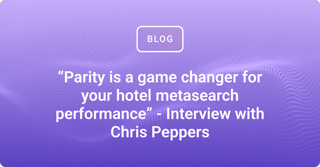Meta-on-meta is the case when metasearch sites like TripAdvisor advertise on Google Hotel Finder or take part in Hotel Ads auctions. Let’s take a look at why it’s happening and what it means for hotels.
Why did meta-on-meta happen?
The last few years have seen a decline in TripAdvisor’s website traffic. Following Expedia Group and Booking Holdings’ advertising reset, Tripadvisor’s return-on-ad-spend rates declined and their revenue growth decreased. Tripadvisor has had to adjust to this impaired growth, and it looks like part of that has involved turning to Google.
Google’s return-on-ad-spend rate dominates the meta search landscape - making it a more attractive auction to advertisers - and GHA’s traffic volume is currently outspacing TripAdvisor’s. Advertising on Google is a way for TripAdvisor to keep their brand in front of consumers while potentially siphoning off some of Google’s traffic. But what does this mean for hotels?
Why is TripAdvisor a dangerous GHA bidder?
-
TripAdvisor has a stronger brand equity than most hotel chains (and almost all independents). Attributes like ‘preferred website’ and ‘lowest price’ are the most important for consumers online. In GHA’s bidding auction, Tripadvisor could now outshine your hotel in the former and the latter (that is, if your hotel’s direct website is present on GHA at all). Indeed, their logo alone could be enough to distract customers from your site - even though those customers want to stay at your hotel.
-
TripAdvisor likely has a higher spending cap than you do. Google’s Hotel Ads Center allows every bidder to define their spending limit. We don’t know exactly how much TripAdvisor are investing in Google - CFO Ernst J. Teunissen claims that Google Hotels is a “relatively small channel for us in the grand scheme of things” - but you can assume that when they are bidding, they’re likely to have a more elastic budget than the average hotel or chain. This results in higher bids, top billing and, ultimately, the best chance to be seen by a potential guest. While that guest might still end up staying on your property, they’re less likely to book through you direct (unless you’re bidding on TripAdvisor too) - meaning a higher cost of acquisition for you to bear.
-
Intense auctions mean higher prices to appear in the top three bids. Google Hotel Ads basics: “Ads in higher positions are typically seen first by users, and tend to get more clicks than if the same ad had ranked lower.” With another big player in town, desired listing spots will be harder to get. Even if you participate in that auction and win, you’ll likely pay more for the privilege.
Is it a wise decision for TripAdvisor?
-
TripAdvisor’s position on Google Hotel Ads not only adds another player to the long bidding list, it also provides Hotels Ads with another source of data that can be used to better understand the travel market. Google are in theory both earning and learning from one of their biggest competitors.
-
The user experience just got more complicated. The online customer journey has acquired yet another step. The “Russian doll” booking process is confusing for the customers, and increases the chances of a drop out prior to getting to your booking engine. Deep links from metas to booking engines have smoothed this flow somewhat, but it’s undeniable that a meta-to-meta-to-direct journey is more confusing for the guest.
What does meta-on-meta mean for hoteliers?
-
The partnership has questionable benefits for hoteliers who advertise on Google to increase direct bookings while also advertising on TripAdvisor’s instant booking program. They might want to cut their spending now on one or both of these channels.
-
It is yet to be determined whether this partnership proves to be beneficial for hotels advertised on meta-on-meta. The positive outcome might allow the hotels to fill their rooms at a potentially lower average acquisition cost than through the traditional OTA channels.
-
While TripAdvisor and Google are potential avenues for direct bookings, OTAs also advertise on these meta sites. A trusted name like TripAdvisor may well win out over heavyweights like Booking.com or Expedia in a GHA auction - so if your hotel is advertising on TripAdvisor, you might then win that booking direct.
-
The more competitive an auction gets, the higher the cost-per-click for the same amount of traffic will be. That affects both TripAdvisor and the advertised hotel, meaning a higher cost of acquisition on direct bookings.
-
In this landscape, hotels are in competition with their own distributors (OTAs) and advertisers (metasearch engines) for the attention of their guests. Various prices from a direct supplier, an intermediary distributor and an advertising platform might further confuse your potential customers.
How to ensure your bids drive revenue?
What can be seen as a one-stop shop for modern consumers to find the best price keeps both hoteliers and OTAs on their toes. Important for chains and crucial for independent hotels, metasearch will continue to provide high visibility and increased conversions. It is up to hoteliers to ensure that the auctions result in an increased ROI. At the Direct Booking Summit in Dallas, Triptease’s Co-Founder and Chief Product Officer Alasdair Snow emphasized the importance of smart bidding by comparing it to a “shopping list you’re not on” if you are not spending money on the right customer at the right time.
Auctions require continuous management and optimization to ensure a profitable return-on-ad-spend. To stay on the pulse of ever-changing bids, hotels can manually monitor and manage all their meta activities on Hotel Ads Center or the Bids API. Independent hotels might want to consider hiring an experienced digital agency to do their bidding for them.
For hotels that want to drive more direct business, Triptease has developed Triptease Metasearch- a traffic acquisition tool designed to redress the balance in metasearch auctions and beyond. Two systems work together to calculate a precise bid amount:
-
Guest Value Index, which registers how a potential customer compares to your ideal customer profile and recognises their real time purchase intent
-
Trip Value Index - which is calculated from the guest's booking conditions, including parity and booking value
Metasearch is one of the top distribution channels in the hospitality industry, and Google Hotel Ads currently dominates it. When the opportunity to compete with OTAs on the same playing field and secure more direct bookings arises, it is up to you to outsmart other bidders.
Additional metasearch resources:
Alisa is Triptease's brand guardian. She speaks four languages and uses them to interview thought leaders and write articles for the industry.









![[Video] Five options for hotels on commission-based (CPA) metasearch models](https://www.triptease.com/hs-fs/hubfs/Resources%20-%20feature%20images/Feature-Image_%5B%5BVideo%5D%20Five%20options%20for%20hotels%20on%20commission-based%20%28CPA%29%20metasearch%20models%5D.png?width=320&height=320&name=Feature-Image_%5B%5BVideo%5D%20Five%20options%20for%20hotels%20on%20commission-based%20%28CPA%29%20metasearch%20models%5D.png)